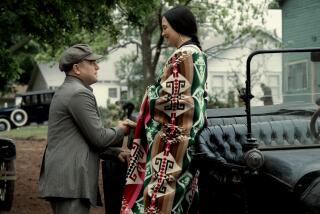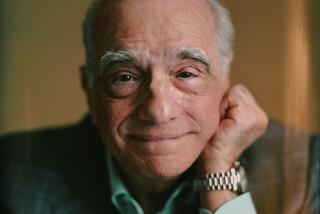Scorsese series brings restored Polish films to L.A.
At least once a year, Martin Scorsese screens Polish director Andrzej Wajda’s 1958 masterpiece “Ashes and Diamonds.”
“It’s still one of the greatest films ever made,” Scorsese said of the haunting drama set on the last day of World War II. “The Wajda films opened the way for what would be a new wave from Poland. This is a little before the French New Wave and the Italian New Wave.”
Thanks to Oscar-winning Scorsese and his Film Foundation, which is dedicated to education and film preservation, U.S. and Canadian audiences can see not only the digitally restored “Ashes and Diamonds” but also 20 other Polish films starting Friday as part of “Martin Scorsese Presents: Masterpieces of Polish Cinema.”
In Los Angeles, the Academy of Motion Picture Arts and Sciences is showcasing the retrospective. It opens at the Los Angeles County Museum of Art’s Bing Theater with Krzysztof Zanussi’s “Camouflage” and “The Constant Factor.” Zanussi will be flying from Warsaw for the opening weekend. He will appear Friday at the double bill and also Saturday at the Cinefamily at the Silent Movie Theatre, which will be screening three Polish films including his “The Illumination.”
Scorsese’s series, which continues through June 24, also includes “Ashes and Diamonds,” “Night Train,” “Man of Iron,” “Black Cross” and “Pharoah.”
These films, which were made from the late 1950s through the 1980s, “had a special quality to them,” Scorsese said. “They had a tension, a moral tension that comes from, like, a thousand years of conflict and struggle — boundaries being changed, the attempts at them being completely wiped out by different forces. There is a beautiful, tragic nature to these pictures.”
And all were made under the oppressive eye of the Communist regime.
Many directors of films in the series, including Wajda, Zanussi and Krzysztof Kieslowski, were alumni of the famed film school at Lodz.
“Lodz film school is so special because top professionals at the time were teaching there,” Zanussi said by email. “In most film schools all over the world, the teachers were frustrated dropouts of the industry. In Lodz, we had active and successful directors and screenwriters as professors.”
It was nearly three years ago when Jedrzej Sablinski, a digital restoration expert, talked with Scorsese when the filmmaker was in Poland to accept an honorary degree from Lodz.
Sablinski, who has been restoring these groundbreaking Polish films for years, noted that Scorsese asked “very detailed questions” about the restoration work. “A month later I got a call from the Film Foundation in New York. They wanted to discuss further this ideal of what we could do with the Polish films. Finally, we ended up with the idea that these films should be seen all over the States.”
Scorsese picked 21 of the 70 titles that had been restored, and the Film Foundation chose Milestone Films, operated by Dennis Doros and Amy Heller, to distribute the series.
“What is fascinating about the Polish films is that a lot of these are made in the context of an authoritarian government with heavy censorship, and a lot of these films end up being heavily censored and oppressed in some way,” said Bernardo Rondeau, the academy’s director of programming.
“But you have these great films channeling their messages and opinions through allegories, some thinly veiled, some much more abstract. Quite often they are dealing with this idea of memory of identity and always with kind of impeccable visuals and piercing intellect.”
Zanussi said that in many of his films, censors forced cuts. “Even if mutilated,” he said, “my films were transmitting some critical view of my society.”
Added Doros: “There is a long history of great filmmakers doing great films under deprived and restricted conditions. It’s an interesting thing that when there are more restrictions, there is sometimes greater creativity.”
----------------
‘Martin Scorsese Presents: Masterpieces of Polish Cinema’
Who: Presented by the Academy of Motion Picture Arts and Sciences
When and Where: Friday-June 24 at the Bing Theater, Los Angeles County Museum of Art, 5905 Wilshire Blvd., Los Angeles. Saturday, June 1-3 and June 8-11 at Cinefamily at the Silent Movie Theatre, 611 N. Fairfax Ave., Los Angeles
Cost: $3-$5 at LACMA, $12 at Cinefamily
Information: https://www.oscars.org, https://www.cinefamily.org, https://www.mspresents.com
More to Read
Only good movies
Get the Indie Focus newsletter, Mark Olsen's weekly guide to the world of cinema.
You may occasionally receive promotional content from the Los Angeles Times.







